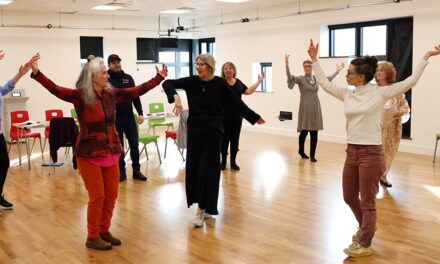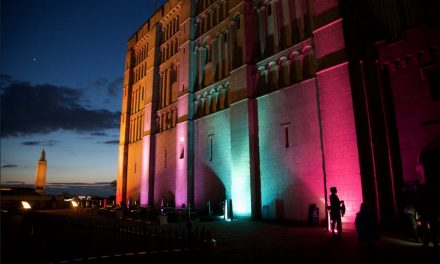Lizzy Watts as Hedda Gabler – photo supplied
This National Theatre production of the Henrik Ibsen classic Hedda Gabler challenges us from the start with a bleak modernistic set and style giving a new context to a play written in 1890. The oppressive social constraint upon women at the time of writing is replaced by the oppressive starkness of a bleak modern apartment. The stage set is three rigid impenetrable walls of bleak plasterboard awaiting any form of decoration and a few bits of worn out furniture and a broken piano.
Company Stage Manager Siân Wiggins showed me around the set and backstage earlier today, pointing out how the set design selected by Director Ivo van Hove reinforced the imposition of constraint on Ibsen’s headstrong free spirit Hedda. There are no onstage exits or entries – the walls forbid. We are all trapped in this room together. Belgian born Ivo van Hove is known for his minimalist style, which allows us to concentrate completely on the actors – their words, their movements, their bodies and expressions. There is nowhere to hide and no chance to relax for Hedda.
Newly married to a man who seemed a good prospect but did not make her fall in love Hedda has returned from a lengthy honeymoon to try and take some control of her restrained existence. Everyone in this drama loves their notion of the beautiful Hedda, but has no idea of her motives, desires or ambition. The seven characters on this stage have complicated relationships, with nothing as simple as it first appears. The previous dramas of their lives are revealed and laid bare before us as we try to imagine where this drama might take us. Whatever you may expect, the Ibsen account is far more shocking and difficult.
If this all seems a bit grim, fear not. There is more humour than we dare acknowledge in this work, helped along by a new script written by Patrick Marber, famed for radio drama and comedy. He has taken a literal translation of Ibsen’s words and bumped it into some modern idiom that gives much delight, particularly with Hedda’s pithy backhanders to the increasingly ludicrous entreaties from her various lovers past and present.
It is hard to say that Hedda Gabler sets us a role model for women, but she certainly gives us a lot to think about, and is nothing if not resourceful in attempting to create a life that she can cope with.

Understudy Cate Cammack – photo from Mandy.com
Headline star Lizzy Watts was sidelined by illness tonight so Hedda was played with some brilliance by understudy Cate Cammack in a faultless and memorable performance. Tall, pale and naturally elegant Cate also gives us an insight into the dangerous intensity of Ibsen’s Hedda Gabler, who has intelligence and ambition in ways that few of us will understand. Even at the dramatic climax of the play understanding why events unfold as they do will challenge us all.
The discomfort of this play is reinforced by the perpetual presence of the maid Berte (Madlena Nedeva) who is a silent witness to every moment of misbehaviour. Hedda’s new husband Tesman (Abhin Galeya) seems simple and straightforward compared to the other characters – the corrupt judge Brack (Adam Best), former lover Lovburg (Richard Byros) and Tesman’s aunt Juliana (Christine Kavanagh). A former schoolfriend Theya Elvsted (Annabel Yates) seeks help reluctantly from Hedda to cement her new love for Lovburg after fleeing her older husband, yet Hedda plays with her like a cat with a mouse. She herself is played by the menacing Brack, given a distinctive interpretation by Adam Best as a bisexual ‘confirmed batchelor’ who dresses like a public school headmaster but has tastes that take him to the seamy depths of late night life.
If you like the intelligent characterisation of the best of Scandinavian Noir drama then Hedda will remind you that Ibsen got there a century before Henning Mankell or Per Wahlöö. This is the same drama of complex people and grisly outcomes that we love to see in a late night BBC4 series full of snow and Volvos, but onstage the characters are closer and more personal to us than any HD telly can deliver. The almost empty room has a few dirty buckets of fresh beautiful flowers – a welcome home to the honeymoon couple – but the flowers fate is to become symbolic of Hedda herself. All the characters except perhaps the maid Berte see Hedda as a beautiful flower for their use, but have little regard for what she feels or says herself. Nobody considers the future of a flower.
The National Theatre have assembled an interesting and capable cast for this impressive and surprisingly joyful production and used some of the most up-to-date staging techniques to give us a new insight into Ibsen’s superb original play. But the night belonged to Cate Cammack, giving a breathtaking performance we shall all remember for many years to come. In a touching recognition of her success the rest of the cast all directed their own applause towards her during the curtain calls. This production takes Ibsen out of the stuffy gaslit sets of old, but shows us themes about the place of women in society that are as powerful and relevant today as when they were first expressed.
© Julian Swainson 2017
Listing:
Hedda Gabler – Tuesday November 7-11, 2017. Eves 7.30pm, Mats 2.30pm Wed, Thur & Sat. Tickets £8-£27.50. Discounts for Friends & Corporate Club, Over 60s, Under 18s, Schools & Groups. BOX OFFICE 01603 630000. For more info or to BOOK ONLINE www.theatreroyalnorwich.co.uk
Read more background in our original article here: https://norwicheye.co.uk/whats-on/national-theatres-acclaimed-drama-heads-for-norwich-next-week/






Recent Comments